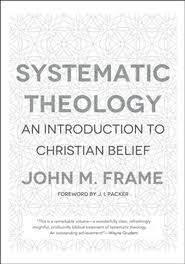
When a longtime theologian finally publishes his systematic theology, it is bound to be a significant occasion. When a professor as widely read and engaging as John Frame does so, it deserves even more attention. This is a serious, yet accessible, theological textbook that can be used profitably by the young seminarian and the old pastor alike. It is rich, honest, careful, and faithful to Scripture.
Like all of Frame’s works, the strength of this one is that it is biblical and readable. From the outset, Frame makes no apology about writing a systematic theology that is based on what the Bible says. Frame is a biblicist in the best sense of the word. He is not first of all trying to survey the historical landscape, let alone to produce an “up to date” theology that interacts with all the latest philosophy and criticism. Consequently, there are many more Bible verses and fewer historical rabbit trails than in many systematic texts. Frame wants to understand what the Bible teaches, always with an aim to worship and application.
And always with an aim himself to be understood, Frame never writes with turgid prose. His style his conversational, almost to a fault at times (so many paragraphs begin with “Now” that I assume the chapters started out as transcribed lectures). Still, in a work this size, it’s no small feat not to come across as workmanlike. The secret to the success of Grudem was his organizational clarity and eminent readability. Frame has the latter.
As for the former—organizational clarity—this book is not quite as good as Grudem’s Systematic Theology, but it’s in the ball park. Each chapter includes study questions, terms, Bible verses to memorize, and a short bibliography for further study. For my taste, I would have used more subheadings, but Frame still uses plenty. The Table of Contents is clear and intuitive; the comprehensive Analytical Outline very useful. A book like this desperately needs a lengthy Scripture Index and a robust Subject/Name Index. Thankfully P&R included both. The font is attractive and easy to read, though the text goes too close to the edge of the page.
The content of the book is reliably evangelical, orthodox, and Reformed. When it comes to recent controversies like inerrancy, New Perspective, feminist language for God, or open theism, Frame consistently turns to the Scriptures and makes a convincing case for the “old paths.” His section on sanctification, in particular, could cut through a lot of current confusion (cf. 994, “Certainly it is a good spiritual exercise to remind ourselves of our justification, or of the cross; certainly it is good to ‘preach the gospel to ourselves’ and to repent of our idolatries. . . .But none of these exercises replaces the act of obedience itself”). I also appreciated Frame’s humility on certain issues (e.g., science and Genesis) and unwillingness to speculate on others (e.g., infralapsarian v. supralapsarian). Frame is not beholden to any party line and has no problem admitting what he does not know or what cannot be known.
There are also a couple weaknesses and a few oddities that can creep in with Frame. I find his thinking deeper and stronger on the doctrine of God, knowledge of God, and word of God (topics on which he’s already written at length), then on, say, soteriology or ecclesiology. Frame takes around 400 pages to cover the doctrine of God, with close to another 100 on the knowledge of God, and almost 200 on the word of God, while his sections on the person and work of Christ are only 20 pages respectively, the ordo salutis around 75 pages, ecclesiology about 60, and eschatology 25 pages. The 20 pages on the person of Christ are very good–clear and to the point–but they just aren’t as developed as some material earlier in the book.
And I confess to having the occasional head scratching moment while reading Frame. From time to time, I wondered if Frame needed to let go of old debates with Kline and the “Escondido Theology.” I also wish he could see more merit in classic impassibility (412-419), and I wondered if he tried too hard to defend Norman Shepherd’s views on justification (974-975). I was surprised that the only two books mentioned as “Resources” at the end of his chapter on “The Task of the Church” were by Tim Keller and Jim Belcher (1046). And finally, while I love the idea of including a chapter on “How Then Shall We Live,” it seemed anticlimactic for the last part of this magnum opus to be a summary of God’s commands to us and for the last word to be “tenth” in parentheses (referencing the tenth commandment).
One final note: whether you think this is a really good systematic theology or one of the most important in the last generation or two, probably depends on how much you get into tri-perspectivalism. I have friends who find Frame’s triads of Normative-Situational-Existential to be extremely enlightening. Try as I might, I find them extremely tenuous. Maybe it’s me. We aren’t all helped by the same pedagogical devices. I admit I’ve always considered discourse analysis a waste of time and I hope to never arc a sentence. I didn’t consider it revolutionary, or all that helpful, when one of my seminary professors summarized almost everything about ministry as a series of threes (head-heart-hands, prophet-priest-king, Father-Son-Spirit, faith-hope-love, speak-feel-do, etc.). I thought, “Okay. That’s kind of cool—everything fits in that chart. Now what?” I confess to having the same reaction with Frame’s triads. Why, for example, is a “good argument” defined as valid (normative), sound (situational), and persuasive (existential)? It’s not immediately clear that the categories have to line up the way they do. And why not four characteristics of a good argument, or two, or five, or ten? Why are the ministries of the church “Word,” “rule,” and “mercy”? Why not add fellowship? Why not simply Word and Sacrament? Or evangelism, edification, exultation, and equipping? I’m just not convinced that everything comes down to the normative, situational, and the existential perspective, nor am I personally helped by the 104 triads sprinkled throughout the book.
But these oddities notwithstanding—and you may not even think them odd—this is a tremendous book. It is careful, heartfelt, wise, accessible, and manifestly steeped in Scripture—the harvest of a lifetime of critical, curious, and submissive reflection on the Bible.
It remains to be seen where Systematic Theology: An Introduction to Christian Belief, will prove to be another Hodge, Berkhof, or Bavinck, but what is clear is that John Frame has written a faithful, doxological theology that will be read by many pastors, many students, and many Christians for many years to come.



